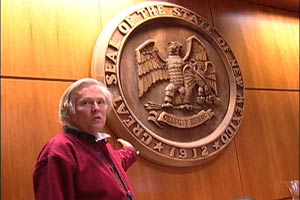By Scott Higham and Lenny Bernstein November 2, 2017
Seven Democratic U.S. senators introduced legislation designed to slow the "revolving door" between federal agencies such as the Drug Enforcement Administration and the pharmaceutical companies they regulate.
"The pharmaceutical industry has a deep-rooted and strong influence in Washington, and a revolving door between drug companies and government cannot undermine the safety of our communities. Patients, families and the public need to have trust that the DEA and FDA are working for them, not powerful Washington interests," Baldwin said."
The legislation would impose a two-year "cooling off" period on former officials from the DEA and the Food and Drug Administration, barring them from assisting pharmaceutical companies with lobbying efforts, as well as expands the definition of "lobbying contact" to include taking part in activities such as strategy sessions, and limits the issues pharmaceutical industry officials can handle if they join the federal government.
There are regulations designed to prevent potential conflicts of interest. The current restrictions include a lifetime ban on participating "personally and substantially" on a "particular matter" that the official had handled while working for the federal government. However, government ethics experts say some of those laws are easily skirted.
" "The bill could go further, but this is a nice step toward slowing the revolving door that is responsible for steering public policy in favor of the drug companies and distributors rather than in the favor of the public," said Scott Amey, general counsel for the Project on Government Oversight, a Washington watchdog group. The proposed legislation follows a joint Washington Post/"60 Minutes" investigation into the opioid industry and its influence in Washington. Companies that manufacture or distribute highly addictive pain pills have hired dozens of high-ranking officials from the DEA during the past decade, many of them from a division that regulates some of the same companies."
A decade ago, DEA investigators began to crack down on large drug companies they suspected of failing to report unusually large orders of painkillers, many of which were winding up in the hands of street dealers and users. Since then, drug companies and the law firms that represent them have hired at least 46 DEA officials -- 32 of them directly from the agency's division that regulates the industry.
One of those DEA officials left the agency and formed a law practice to represent opioid companies. He later helped to write a law that undercut the agency's enforcement efforts against large companies accused of violating federal drug laws, according to government documents and a legal analysis of the law by the DEA's chief administrative judge.
Baldwin said her proposed legislation would serve as a check on the power the pharmaceutical industry wields on Capitol Hill. She cited an investigation by the Associated Press and the Center for Public Integrity that found that the makers of prescription painkillers spent $880 million on campaign contributions and lobbying efforts between 2006 and 2015.
>>>>>>>>>>>>>>>>>>>>>>>>>
Regulatory Affairs Professionals Society is just down the same street from the FDA, and lo and behold, we find some strange arguments in this article by Zachary Brennan: FDA and Industry: How Dangerous is the Revolving Door?
Earlier this week, a former deputy director of the US Food and Drug Administration's Office of Generic Drugs settled charges that he provided tips on drug approvals to three hedge fund managers that made tens of millions off the non-public information. The settlement raises some important questions on the so-called revolving door between industry and FDA, and what it means for patient safety. While the answers to those questions may never be fully answered, a recent flurry of employees moving between FDA and industry, as well as this latest settlement, have re-ignited the conversation around the connections between industry and the regulators that protect the public.What many who complain about the coziness between industry and FDA do not realize is that both sides work together on a continual basis--from cooperating and offering advice on drug development plans to tracking adverse events to forging agreements on the various user fees that industry must pay to FDA for its services that ensure a structured review process for drugs and devices. In addition, FDA, which typically pays up to three times less than an industry salary, is struggling to fill more than 500 vacant positions and a lot of that needed expertise can come from within industry.
The uglier side of this revolving door can be seen in this week's settlement of Securities and Exchange Commission charges of insider trading against two hedge fund managers and their source, Gordon Johnston, who worked for a dozen years at FDA and later at the Generic Pharmaceutical Association. Johnston leaked approval information to two of the hedge fund managers, one of whom reaped unlawful profits of nearly $32 million. One of those hedge fund managers committed suicide in June and Johnston has pleaded guilty to multiple charges that carry possible prison terms and millions in fines.
>>>>>>>>>>>>>>>>>>>
(Leave it to the Canadians to arrive at serious and compelling facets of the truth about their next door neighbors, the larger overview". Not all Canadians are so naively accepting of the poisons and bad regulations in which we seem to wallow)
How Monsanto Invaded, Occupied and now CONTROLS Government Regulators
Next Page 1 | 2 | 3 | 4 | 5 | 6 | 7 | 8 | 9 | 10 | 11
(Note: You can view every article as one long page if you sign up as an Advocate Member, or higher).





